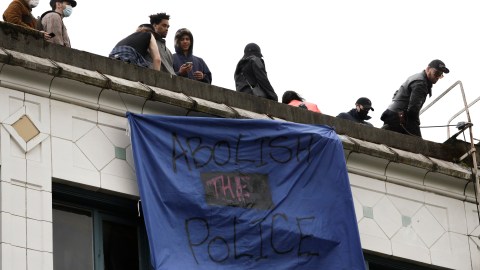An expert explains what ‘Abolish the Police’ really means

Photo by JASON REDMOND/AFP via Getty Images
- People are talking a lot about abolishing police lately, but what does that mean?
- We spoke with an expert on the subject, who reveals the nuance in the idea.
- Like any broad concept, there are a diversity of ideas expressed in the slogan.
Unless you’ve been living under a rock, you are undoubtedly aware that Americans are taking to the streets in opposition to police brutality in the wake of the deaths of George Floyd, Breonna Taylor, and countless others. One of the protesters’ demands is articulated by the seemingly rash statement, “Abolish the Police.”
On the face of it, this demand can seem like anarchistic nonsense. One might ask how society will function with nobody filling the duties of the police departments. However, getting past the rhetoric allows us to dive into the idea behind the phrasing. There, we find a more nuanced notion with plenty of intellectual history behind it.
To learn more about this, I spoke with Maira Khwaja, the Engagement Director at the Invisible Institute in Chicago. A lightly edited transcript of our interview appears below:
How would you describe the idea of Police Abolition?
“Police and prison abolition is like a mindset of trying to imagine and work towards a society where police would not be necessary. It’s not about ‘we end police tomorrow.’ It’s about trying to create a world where we don’t need police and prisons. For somebody just learning about it for the first time, I can imagine it would sound impossible. The point is about imagining what else we need to come up first.”
Why is this preferable to reform efforts?
“Abolitionist reforms seek to take power from the police and put it elsewhere where it would reduce crime at its source. In Chicago, if somebody is struggling with homelessness, you have to go through the police in order to get any homeless services. This can make people too afraid to get the help they need. What if there was a different front door to access the services they need? An abolitionist reform might be to create an alternative first responder for dealing with homelessness in the city. Chicago has ‘advanced’ reforms. We need officers to record each time they pull a gun. Anecdotally, we can see this isn’t happening.”
Is police abolition the same thing as “defund the police” that you see on so many protest signs these days?
“Not the same, but defund the police is part of abolition. The critical thing is that defund the police doesn’t go far enough. It must be defund and invest. We have to take the money from the police and put it into something that has been defunded a lot. In Chicago, this would be education and housing. ‘Defund’ sounds radical until you realize how many other social services have been defunded over the last few decades.”
In the mind of a supporter of police abolition, how do the police work? How does this impact the viewpoint?
“Think of abolition as ‘What if the police didn’t exist at all? What would we have to do to deal with people’s help and safety and crisis response?’ We would have some group to fight crime. Pure abolitionists would say ‘policing should not exist.’
I say, I’m not entirely there yet on not having any system of policing. There would be crime and exploitation. I would like to see an alternative kind of first response when crimes are committed.
Jaime Kalvin (also of the Invisible Institute) suggested that there is a core function of police, reacting to situations where people feel physically threatened. I would have police address that core function and leave everything else to other services and just have the police address the truest emergencies.”
Now, Maira Khwaja can only speak for their point of view, but they identify many key points in the abolitionist cause. Namely, reducing the number of things the police are called in for, taking police funding and putting it into programs that prevent crime, and considering what alternative methods of dealing with crime and safety exist that don’t involve the police force.
Why Live Video of Police Violence Is So Traumatic — and So …
The significant points behind the police abolition movement have been floating around for decades. Former vice presidential candidate and activist Dr. Angela Davis has been discussing the idea for years. Her work in the related concept of prison abolition does too. In one of her recent interviews, she further explains the idea:
“Defunding the police is not simply about withdrawing funding for law enforcement and doing nothing else. And it appears as if this is the rather superficial understanding that has caused Biden to move in the direction he’s moving in. It’s about shifting public funds to new services and new institutions — mental health counselors, who can respond to people who are in crisis without arms. It’s about shifting funding to education, to housing, to recreation. All of these things help to create security and safety. It’s about learning that safety, safeguarded by violence, is not really safety. And I would say that abolition is not primarily a negative strategy. It’s not primarily about dismantling, getting rid of, but it’s about reenvisioning. It’s about building anew.”
Mariame Kaba, the director of Project NIA, has been involved in the prison abolition movement for a while and lays out their ideas in a New York Times OpEd which argues that our current model of crime prevention is less effective than you think and that alternatives would not only reduce police brutality but prevent more crime in the long run.
Professor Alex Vitale of Brooklyn College explained his stances in an interview with Jacobin, where he argues that police brutality is a feature of our current system which has endured despite decades of well-meaning people admitting the problem was real. He then argues that dramatic change is necessary to solve the problem. His ideas can also be found in his book “The End of Policing,” which is currently available by download for free.
As Maira Khwaja said, the concept is broad, and there are many views within it. Some of these thinkers advance ideas that others would reject as too much or too little. Despite this, the fundamental concepts of reducing the number of issues we delegate to the police and taking the money this saves and putting it into things like education, healthcare, and social services remains.
Activists are not known for getting the phrasing of their demands reviewed by savvy media gurus who can make them inoffensive or grant them laser-like precision. While the phrase “abolish the police” is an inaccurate depiction of what many, but not all, activists want to do, it is a bold enough phrase to ignite the fires of debate –which is precisely what activism is supposed to do.
Given that you’ve just read an entire article considering what the idea is, it seems like the phrasing has worked wonders.





